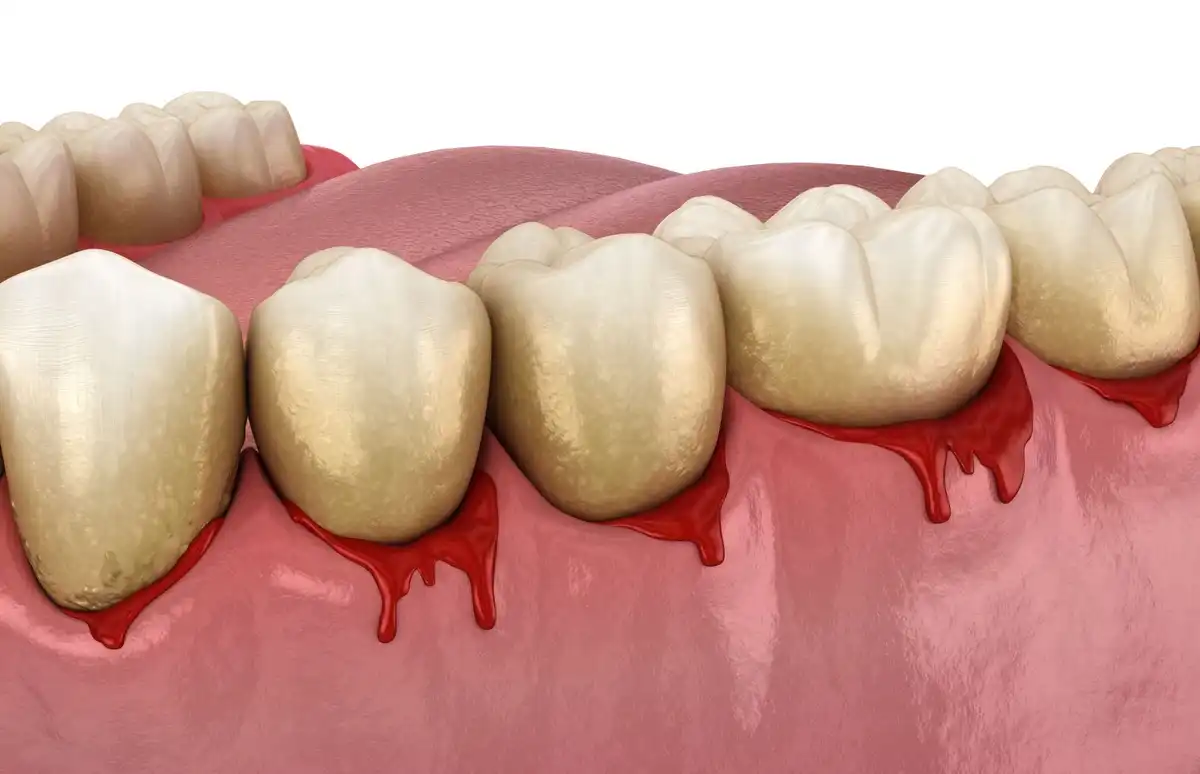Bleeding Gums: Causes, Treatment, And Prevention


Bleeding gums are not normal! Healthy gums shouldn’t ever bleed when you’re brushing or flossing. If you do have bleeding gums or are trying to figure out “why my gums bleed”, there are usually two different reasons: gum disease, or a systemic health problem.
Bleeding gums are your body’s way of telling you that there’s something wrong.
What Are Bleeding Gums?
We all bleed if we get hurt. You cut yourself on something, you bleed. But it’s not normal for us to press on a certain area of our body and have it bleed without us realizing something wrong is going on. It’s no different with bleeding gums.
Some people’s gums only bleed when they floss. But people with more inflamed gums might see bleeding every time they brush their teeth.
Just be warned, if you’re someone who smokes, vapes, or uses tobacco products, your mouth might not bleed even when it’s infected (because all of those tiny little blood vessels start shrinking up and atrophying.) If you DO use those products, be sure to get a regular perio exam to make sure there’s not gum disease hiding out without you knowing about it. Or better, just don’t use them at all.
Why My Gums Bleed (Common Causes)
The most common reason for bleeding gums is just not keeping them clean enough every day. AKA brushing and flossing. When plaque starts to build up, your body sees it as bacteria that shouldn’t be there. If it hangs out for too long, your immune system starts rushing antibodies — which are in your bloodstream — to the infection. It is very important to maintain a healthy oral care routine.
When you haven’t brushed your gums really well in a while, or you don’t clean under your gumlines and between teeth with floss on a daily basis, then it’s probably just a matter of time before your gums start to bleed.
The first time you take time to floss or brush your gumlines after a long break is usually going to be when you spot the bleeding. Or, it could be during your dental cleaning when we start removing all of that nasty buildup (no, we’re not trying to kill you!)
1) Gingivitis
In the majority of bleeding gums cases, the root cause is gingivitis. Gingiva are your gum tissues, and “-itis” means “inflammation of.” When your gums are swollen, it’s almost like you have a puffy wound somewhere else on your body. If you were to start touching or pressing it, it might bleed.
But with your gums, they’re full of blood vessels. So, when they get inflamed, they bleed far easier.
How do gums get inflamed? By plaque bacteria hanging out around them for too long. If you don’t brush your gums or floss and then all of a sudden you do — but you have gingivitis — you’re going to see some bleeding.
2) Periodontitis
When gingivitis isn’t reversed with good oral hygiene, it progresses into a more advanced stage of gum disease, called periodontitis or periodontal disease. At this point, those bacteria have snuck their way well under your gums, causing them to detach from your tooth roots.
With periodontitis, there’s usually even more bleeding than what we see with gingivitis. All of your blood vessels are trying to rush antibodies to the infection.
Here’s the kicker: scientific research (You guys know how I feel about having evidence!) now shows us that the bacteria in our mouths can spread through those blood vessels to the rest of our body, increasing our chances and severity of health problems like:
- Diabetes
- Stroke
- Heart attack
- High blood pressure
- Infertility
…and a host of other issues. So, if your gums are bleeding, remember that or oral and systemic health is a two-way street.
3) Bleeding Gums With Diabetes
People with diabetes are more at risk to develop gum issues like gingivitis and periodontitis, which means there’s a greater risk of having bleeding gums.
If you’re wondering why my gums bleed — and it seems like nothing is helping — diabetics are in a unique situation. Instead of just focusing on your blood glucose levels or bleeding gums, you need to tackle them together.
The research shows that people who improve their oral hygiene to reduce gum disease will see a better chance of stabilized blood glucose levels. And when they take care of their blood glucose, they see an improvement in red, swollen, bleeding gums as long as they’re practicing good oral hygiene. The two go together.
4) Leukemia
As a cancer that affects your blood platelets, bleeding gums are also a side effect of leukemia. If you’re practicing good oral hygiene, eating a balanced diet, and haven’t had a problem with your gums bleeding in the past, it never hurts to go to your general practitioner for a yearly checkup and bloodwork.
With leukemia, your body and immune system aren’t able to work as efficiently as they’re supposed to. Increased bleeding is a common symptom, so your mouth is a natural place to look for the warning signs.
If you suspect that you have leukemia, watch for other symptoms like chronic fatigue, recurring nosebleeds, swollen lymph nodes, and an increase in bruising.
5) Thrombocytopenia
When your body has a cut and starts to bleed, it’s the blood platelets that clot up to stop the bleeding. But with thrombocytopenia, you have fewer blood platelets than normal. So, if injure yourself or have an open wound, you could essentially just keep bleeding. You can also see bleeding just under your skin, bleed inside of your digestive tract, and experience frequent bruising.
Of course, if you have thrombocytopenia, bleeding gums is probably the least of your worries. That being said, be sure you’re using an extra-soft toothbrush and possibly a water flosser to avoid any accidental trauma to your gums while you’re cleaning around your teeth.
6) Hemophilia Or Von Willebrand Disease
People with a hereditary background of hemophilia/Von Willebrand disease need to be checked to see if they have the genetic disorder. With this condition, the body doesn’t make a special type of protein that it needs to help platelets create blood clots or “plugs”.
If you have bleeding gums, most people only see bleeding for a few minutes and then it goes away. People with hemophilia can experience more chronic bleeding. If your gums get infected with gingivitis or periodontitis, you need to treat the oral infection thoroughly to prevent more bleeding or those oral bacteria from transferring into your bloodstream.
7) Vitamin Deficiencies
Being deficient in iron can lead to anemia, which is a lack of red blood cells. Oddly, it can cause bleeding gums without the classic signs of gingivitis. Instead of being swollen and red, your gums might look completely healthy. But if you go to brush and floss, the bleeding is just as heavy as someone with gingivitis.
If you know you tend to be borderline anemic, you can increase your iron intake by eating foods like:
- Red meat
- Leafy greens, including spinach
- Meals cooked in a cast-iron skillet
8) Talk To Your Dentist About Other Reasons
This isn’t a comprehensive list of all bleeding gums causes, but they are the most common ones to keep in mind. Other risk factors that can increase a person’s chance of having bleeding gums include pregnancy, your monthly cycle, or even if you’re wearing orthodontic appliances. Scheduling regular checkups with your dentist and communicating with your dental team can help you identify or stop the cause behind your bleeding.
Bleeding Gums Treatment
Finally, see your dentist and hygienist for a professional cleaning at least twice a year. If you have active periodontitis with heavy tartar buildup, you will likely need a deep cleaning and more frequent cleanings to prevent relapse.
Preventing Bleeding Gums
Healthy gums don’t bleed. To avoid bleeding gums, you should have a consistent brushing and flossing routine. If you can’t figure out why they’re bleeding, see your dentist asap to rule out anything more serious.

Make your inbox smile!
Subscribe






